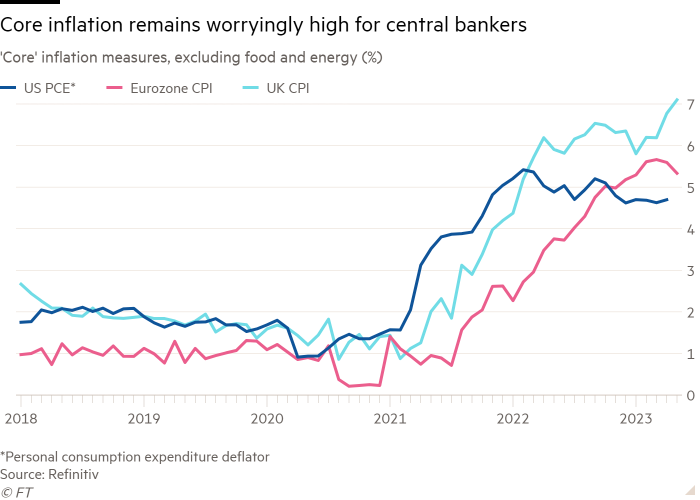Global central banks are entering a new phase in their battle with inflation as economists warn that recessions will be the price of achieving shared 2 per cent goals.
Headline rates of inflation across most of the world’s economies have fallen back sharply since the autumn but core rates — which exclude volatile categories such as energy and food — remain at or close to multi-decade highs.
These rates, seen as a better gauge of underlying price pressures, have sparked concern that central banks will struggle to hit their targets without wiping out growth.
“The next leg of the improvement in the inflation numbers is going to be harder,” said Carl Riccadonna, chief US economist at BNP Paribas. “It requires more pain, and that pain likely involves a recession in the back half of the year.”
Torsten Slok, chief economist at Apollo Global Management, added: “The only way to get inflation down to 2 per cent is to crush demand and slow down the economy in a more substantial way.”

The Bank of England has a particular problem, raising rates by a substantial half percentage point on Thursday, a day after data for May showed core inflation rising to 7.1 per cent.
Its peers were able to move less aggressively at their respective meetings last week. The European Central Bank raised rates by a quarter-point while the US Federal Reserve skipped a rate rise entirely, but both signalled inflation was far from vanquished and warned of further increases ahead.
Joachim Nagel, head of Germany’s central bank, has warned inflation is a “very greedy beast” and it would be a “first-order error” to stop raising interest rates.
The Fed’s favoured measure of core inflation, the personal consumption expenditures index, has hovered around 4.7 per cent for the past six months. The eurozone’s equivalent figure has been sticky at about 5 per cent.
Fed chair Jay Powell told the US Congress this week that the “process of getting inflation back down to 2 per cent has a long way to go”.
Markets are responding to central banks’ renewed hawkishness. They now expect US interest rates to peak at 5.25-5.5 per cent, up from 5-5.25 per cent at the start of the month. In the eurozone, investors are increasingly pricing in the possibility of rate rises in July and September.
However, some traders question the resolve of central bankers. A Bank of America survey of 81 fixed-income fund managers found 60 per cent thought central banks would accept 2 per cent to 3 per cent inflation if it meant avoiding a recession. Just over a quarter thought rate-setters would be willing to generate a recession to lower it further.

Some economists think core inflation will soon follow the headline measure down. Referring to the eurozone, Martin Wolburg, an economist at Italian insurer Generali, said: “If you look at pipeline price pressures, they have come right down — producer price inflation is almost zero — and that will feed through.”
But Isabel Schnabel, a member of the ECB’s executive board, said eliminating high inflation was still “fraught with risks”, arguing rate-setters needed to “err on the side of doing too much rather than too little”.
One problem in defeating inflation is that the labour market remains tight on both sides of the Atlantic.
Former Fed chair Ben Bernanke and ex-IMF chief economist Olivier Blanchard have warned that wages need to rise at a similar pace to productivity growth to have any meaningful impact on inflation.
Schnabel said governments were adding to inflationary pressures by failing to reverse the spending provided to offset the impact of the Covid-19 pandemic and Europe’s energy crisis. Only half of this emergency spending was expected to be reversed by 2025, she said.
